Detailed System Management Plan for International Plastics' ERP System
VerifiedAdded on 2022/08/10
|8
|1550
|272
Report
AI Summary
This report outlines a system management plan for International Plastics, addressing the implementation of an Enterprise Resource Planning (ERP) system. It details the benefits of the software application, including improved efficiency, customer service, data security, reporting, flexibility, and productivity. The plan incorporates CRM and SCM models to enhance customer relationships and supply chain management. It also explores ethical and regulatory concerns, emphasizing data security and unauthorized access. The report justifies the plan in terms of improved business performance by streamlining processes and optimizing resource allocation. It addresses current trends like Business Intelligence integration and security concerns such as poor configuration and inadequate access control. The conclusion emphasizes the importance of proper ERP implementation with adequate security measures for successful decision-making and secure customer data.

Running head: REPORT
System Management Plan
Name of the Student
Name of the University
Author’s Note
System Management Plan
Name of the Student
Name of the University
Author’s Note
Paraphrase This Document
Need a fresh take? Get an instant paraphrase of this document with our AI Paraphraser
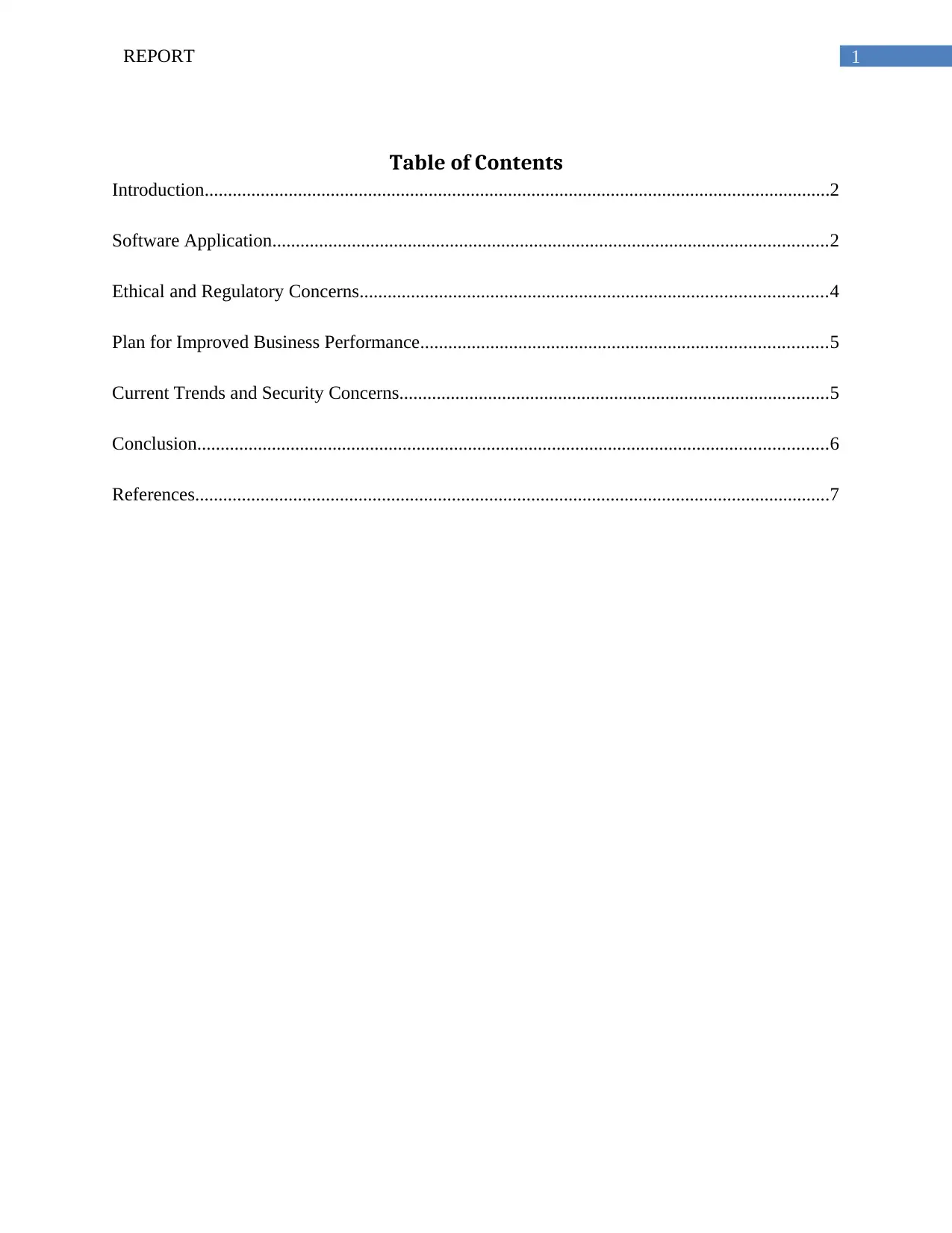
1REPORT
Table of Contents
Introduction......................................................................................................................................2
Software Application.......................................................................................................................2
Ethical and Regulatory Concerns....................................................................................................4
Plan for Improved Business Performance.......................................................................................5
Current Trends and Security Concerns............................................................................................5
Conclusion.......................................................................................................................................6
References........................................................................................................................................7
Table of Contents
Introduction......................................................................................................................................2
Software Application.......................................................................................................................2
Ethical and Regulatory Concerns....................................................................................................4
Plan for Improved Business Performance.......................................................................................5
Current Trends and Security Concerns............................................................................................5
Conclusion.......................................................................................................................................6
References........................................................................................................................................7
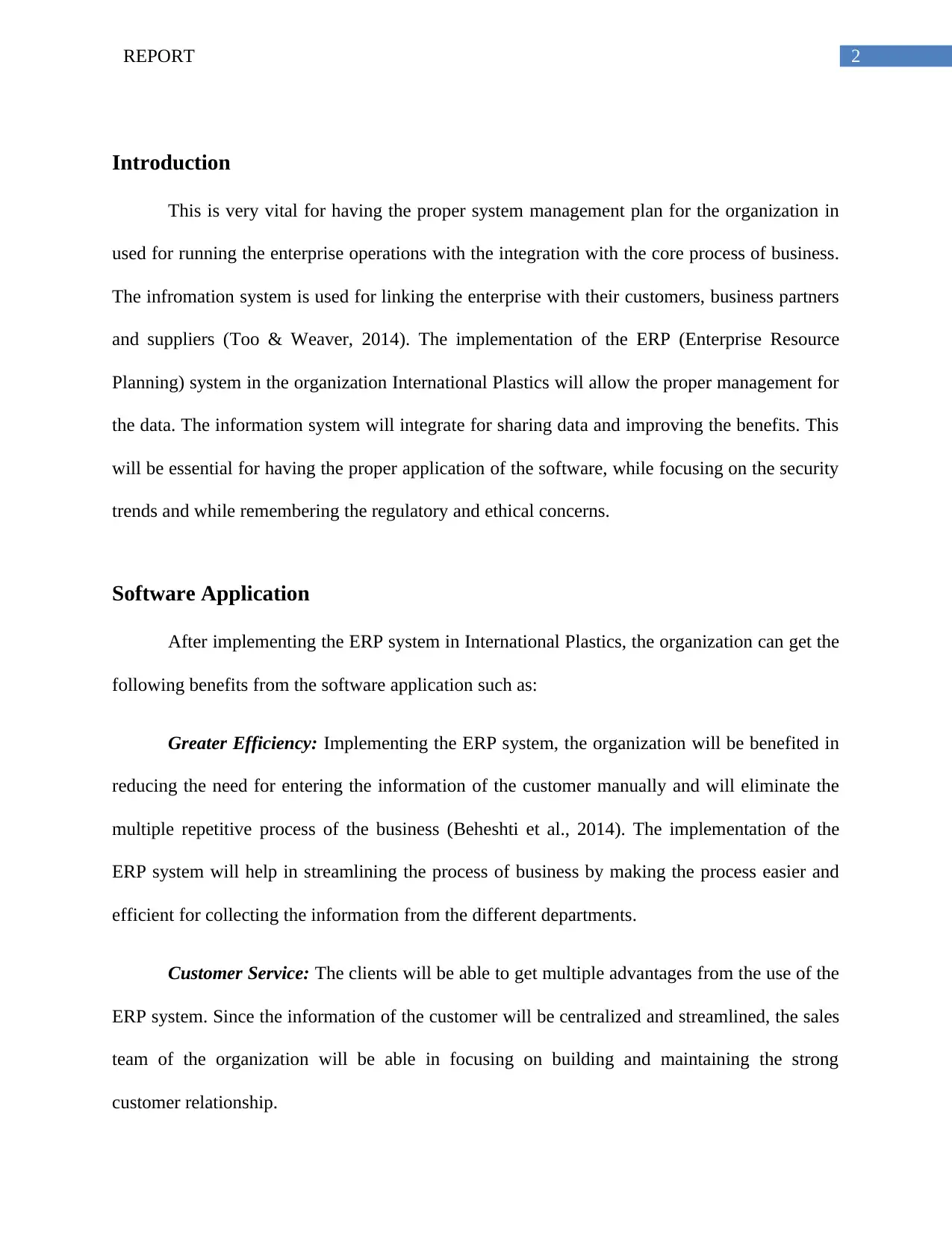
2REPORT
Introduction
This is very vital for having the proper system management plan for the organization in
used for running the enterprise operations with the integration with the core process of business.
The infromation system is used for linking the enterprise with their customers, business partners
and suppliers (Too & Weaver, 2014). The implementation of the ERP (Enterprise Resource
Planning) system in the organization International Plastics will allow the proper management for
the data. The information system will integrate for sharing data and improving the benefits. This
will be essential for having the proper application of the software, while focusing on the security
trends and while remembering the regulatory and ethical concerns.
Software Application
After implementing the ERP system in International Plastics, the organization can get the
following benefits from the software application such as:
Greater Efficiency: Implementing the ERP system, the organization will be benefited in
reducing the need for entering the information of the customer manually and will eliminate the
multiple repetitive process of the business (Beheshti et al., 2014). The implementation of the
ERP system will help in streamlining the process of business by making the process easier and
efficient for collecting the information from the different departments.
Customer Service: The clients will be able to get multiple advantages from the use of the
ERP system. Since the information of the customer will be centralized and streamlined, the sales
team of the organization will be able in focusing on building and maintaining the strong
customer relationship.
Introduction
This is very vital for having the proper system management plan for the organization in
used for running the enterprise operations with the integration with the core process of business.
The infromation system is used for linking the enterprise with their customers, business partners
and suppliers (Too & Weaver, 2014). The implementation of the ERP (Enterprise Resource
Planning) system in the organization International Plastics will allow the proper management for
the data. The information system will integrate for sharing data and improving the benefits. This
will be essential for having the proper application of the software, while focusing on the security
trends and while remembering the regulatory and ethical concerns.
Software Application
After implementing the ERP system in International Plastics, the organization can get the
following benefits from the software application such as:
Greater Efficiency: Implementing the ERP system, the organization will be benefited in
reducing the need for entering the information of the customer manually and will eliminate the
multiple repetitive process of the business (Beheshti et al., 2014). The implementation of the
ERP system will help in streamlining the process of business by making the process easier and
efficient for collecting the information from the different departments.
Customer Service: The clients will be able to get multiple advantages from the use of the
ERP system. Since the information of the customer will be centralized and streamlined, the sales
team of the organization will be able in focusing on building and maintaining the strong
customer relationship.
⊘ This is a preview!⊘
Do you want full access?
Subscribe today to unlock all pages.

Trusted by 1+ million students worldwide
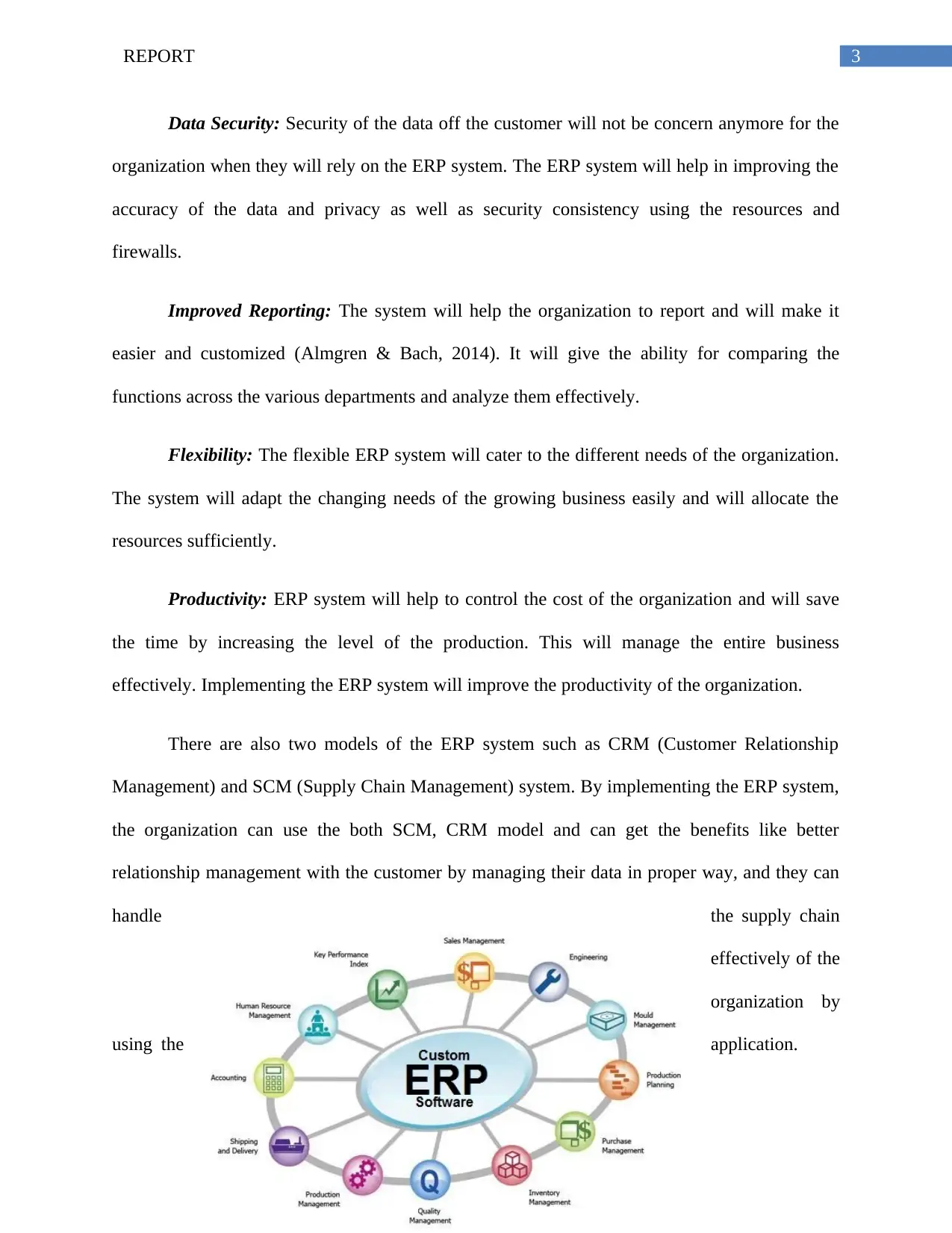
3REPORT
Data Security: Security of the data off the customer will not be concern anymore for the
organization when they will rely on the ERP system. The ERP system will help in improving the
accuracy of the data and privacy as well as security consistency using the resources and
firewalls.
Improved Reporting: The system will help the organization to report and will make it
easier and customized (Almgren & Bach, 2014). It will give the ability for comparing the
functions across the various departments and analyze them effectively.
Flexibility: The flexible ERP system will cater to the different needs of the organization.
The system will adapt the changing needs of the growing business easily and will allocate the
resources sufficiently.
Productivity: ERP system will help to control the cost of the organization and will save
the time by increasing the level of the production. This will manage the entire business
effectively. Implementing the ERP system will improve the productivity of the organization.
There are also two models of the ERP system such as CRM (Customer Relationship
Management) and SCM (Supply Chain Management) system. By implementing the ERP system,
the organization can use the both SCM, CRM model and can get the benefits like better
relationship management with the customer by managing their data in proper way, and they can
handle the supply chain
effectively of the
organization by
using the application.
Data Security: Security of the data off the customer will not be concern anymore for the
organization when they will rely on the ERP system. The ERP system will help in improving the
accuracy of the data and privacy as well as security consistency using the resources and
firewalls.
Improved Reporting: The system will help the organization to report and will make it
easier and customized (Almgren & Bach, 2014). It will give the ability for comparing the
functions across the various departments and analyze them effectively.
Flexibility: The flexible ERP system will cater to the different needs of the organization.
The system will adapt the changing needs of the growing business easily and will allocate the
resources sufficiently.
Productivity: ERP system will help to control the cost of the organization and will save
the time by increasing the level of the production. This will manage the entire business
effectively. Implementing the ERP system will improve the productivity of the organization.
There are also two models of the ERP system such as CRM (Customer Relationship
Management) and SCM (Supply Chain Management) system. By implementing the ERP system,
the organization can use the both SCM, CRM model and can get the benefits like better
relationship management with the customer by managing their data in proper way, and they can
handle the supply chain
effectively of the
organization by
using the application.
Paraphrase This Document
Need a fresh take? Get an instant paraphrase of this document with our AI Paraphraser
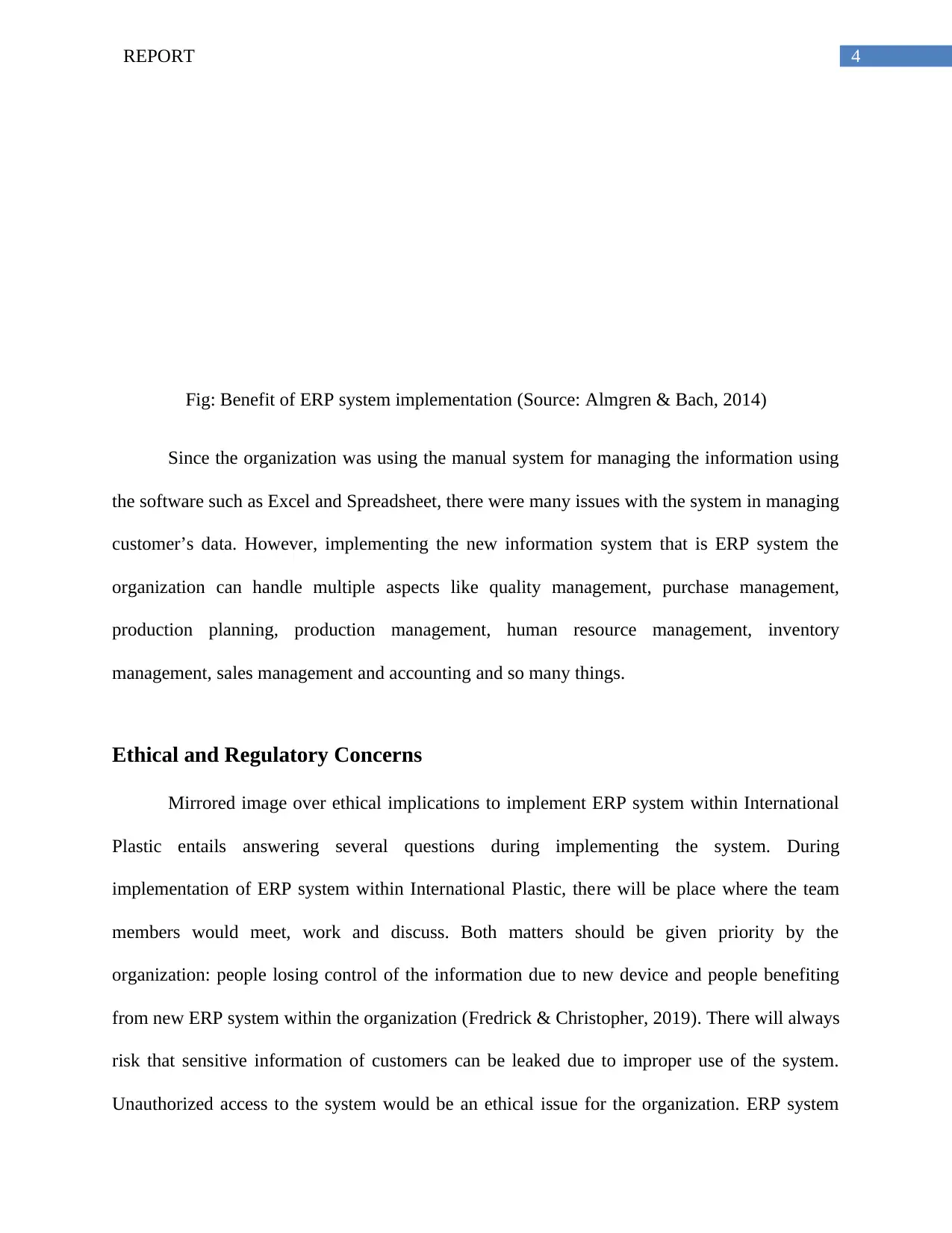
4REPORT
Fig: Benefit of ERP system implementation (Source: Almgren & Bach, 2014)
Since the organization was using the manual system for managing the information using
the software such as Excel and Spreadsheet, there were many issues with the system in managing
customer’s data. However, implementing the new information system that is ERP system the
organization can handle multiple aspects like quality management, purchase management,
production planning, production management, human resource management, inventory
management, sales management and accounting and so many things.
Ethical and Regulatory Concerns
Mirrored image over ethical implications to implement ERP system within International
Plastic entails answering several questions during implementing the system. During
implementation of ERP system within International Plastic, there will be place where the team
members would meet, work and discuss. Both matters should be given priority by the
organization: people losing control of the information due to new device and people benefiting
from new ERP system within the organization (Fredrick & Christopher, 2019). There will always
risk that sensitive information of customers can be leaked due to improper use of the system.
Unauthorized access to the system would be an ethical issue for the organization. ERP system
Fig: Benefit of ERP system implementation (Source: Almgren & Bach, 2014)
Since the organization was using the manual system for managing the information using
the software such as Excel and Spreadsheet, there were many issues with the system in managing
customer’s data. However, implementing the new information system that is ERP system the
organization can handle multiple aspects like quality management, purchase management,
production planning, production management, human resource management, inventory
management, sales management and accounting and so many things.
Ethical and Regulatory Concerns
Mirrored image over ethical implications to implement ERP system within International
Plastic entails answering several questions during implementing the system. During
implementation of ERP system within International Plastic, there will be place where the team
members would meet, work and discuss. Both matters should be given priority by the
organization: people losing control of the information due to new device and people benefiting
from new ERP system within the organization (Fredrick & Christopher, 2019). There will always
risk that sensitive information of customers can be leaked due to improper use of the system.
Unauthorized access to the system would be an ethical issue for the organization. ERP system
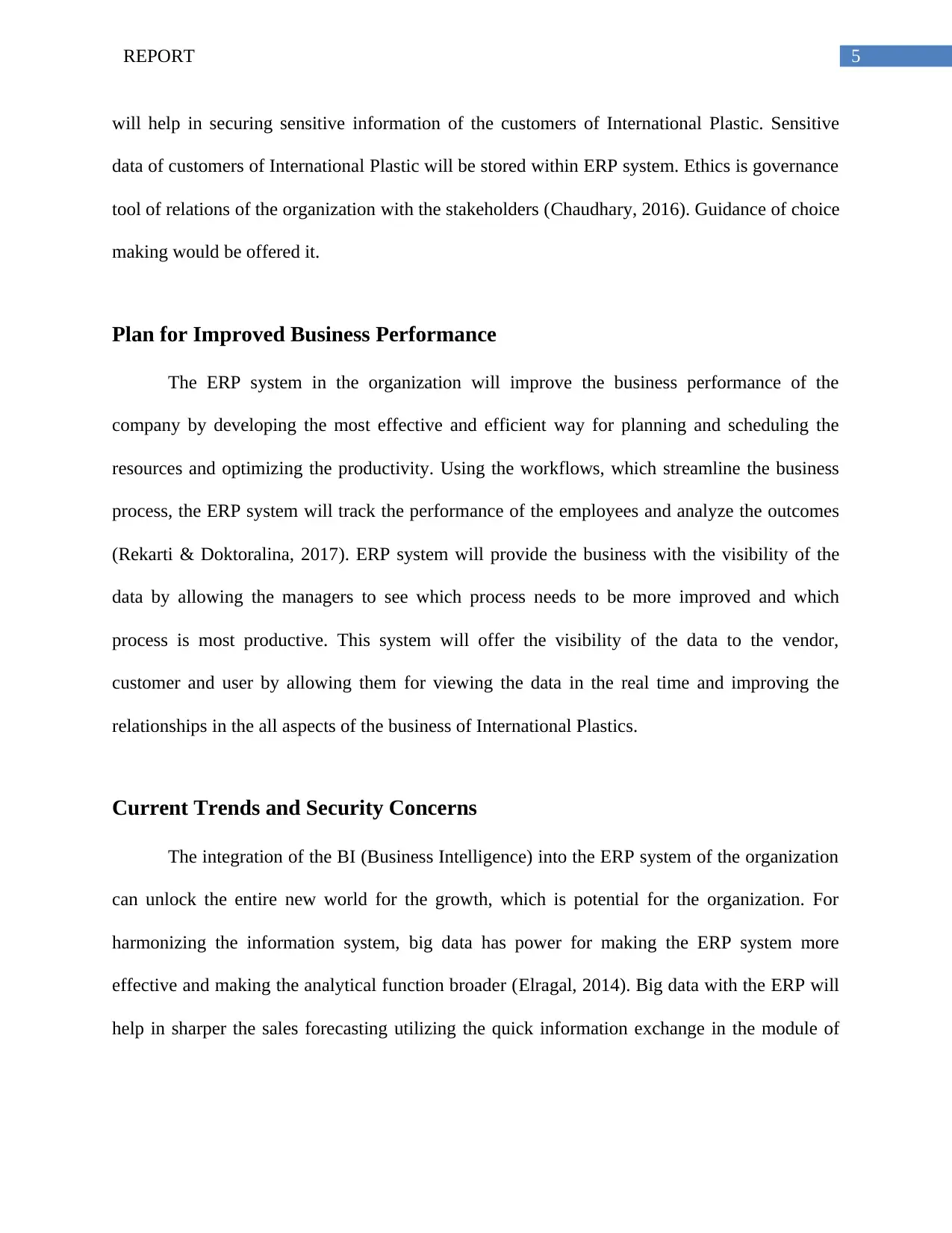
5REPORT
will help in securing sensitive information of the customers of International Plastic. Sensitive
data of customers of International Plastic will be stored within ERP system. Ethics is governance
tool of relations of the organization with the stakeholders (Chaudhary, 2016). Guidance of choice
making would be offered it.
Plan for Improved Business Performance
The ERP system in the organization will improve the business performance of the
company by developing the most effective and efficient way for planning and scheduling the
resources and optimizing the productivity. Using the workflows, which streamline the business
process, the ERP system will track the performance of the employees and analyze the outcomes
(Rekarti & Doktoralina, 2017). ERP system will provide the business with the visibility of the
data by allowing the managers to see which process needs to be more improved and which
process is most productive. This system will offer the visibility of the data to the vendor,
customer and user by allowing them for viewing the data in the real time and improving the
relationships in the all aspects of the business of International Plastics.
Current Trends and Security Concerns
The integration of the BI (Business Intelligence) into the ERP system of the organization
can unlock the entire new world for the growth, which is potential for the organization. For
harmonizing the information system, big data has power for making the ERP system more
effective and making the analytical function broader (Elragal, 2014). Big data with the ERP will
help in sharper the sales forecasting utilizing the quick information exchange in the module of
will help in securing sensitive information of the customers of International Plastic. Sensitive
data of customers of International Plastic will be stored within ERP system. Ethics is governance
tool of relations of the organization with the stakeholders (Chaudhary, 2016). Guidance of choice
making would be offered it.
Plan for Improved Business Performance
The ERP system in the organization will improve the business performance of the
company by developing the most effective and efficient way for planning and scheduling the
resources and optimizing the productivity. Using the workflows, which streamline the business
process, the ERP system will track the performance of the employees and analyze the outcomes
(Rekarti & Doktoralina, 2017). ERP system will provide the business with the visibility of the
data by allowing the managers to see which process needs to be more improved and which
process is most productive. This system will offer the visibility of the data to the vendor,
customer and user by allowing them for viewing the data in the real time and improving the
relationships in the all aspects of the business of International Plastics.
Current Trends and Security Concerns
The integration of the BI (Business Intelligence) into the ERP system of the organization
can unlock the entire new world for the growth, which is potential for the organization. For
harmonizing the information system, big data has power for making the ERP system more
effective and making the analytical function broader (Elragal, 2014). Big data with the ERP will
help in sharper the sales forecasting utilizing the quick information exchange in the module of
⊘ This is a preview!⊘
Do you want full access?
Subscribe today to unlock all pages.

Trusted by 1+ million students worldwide
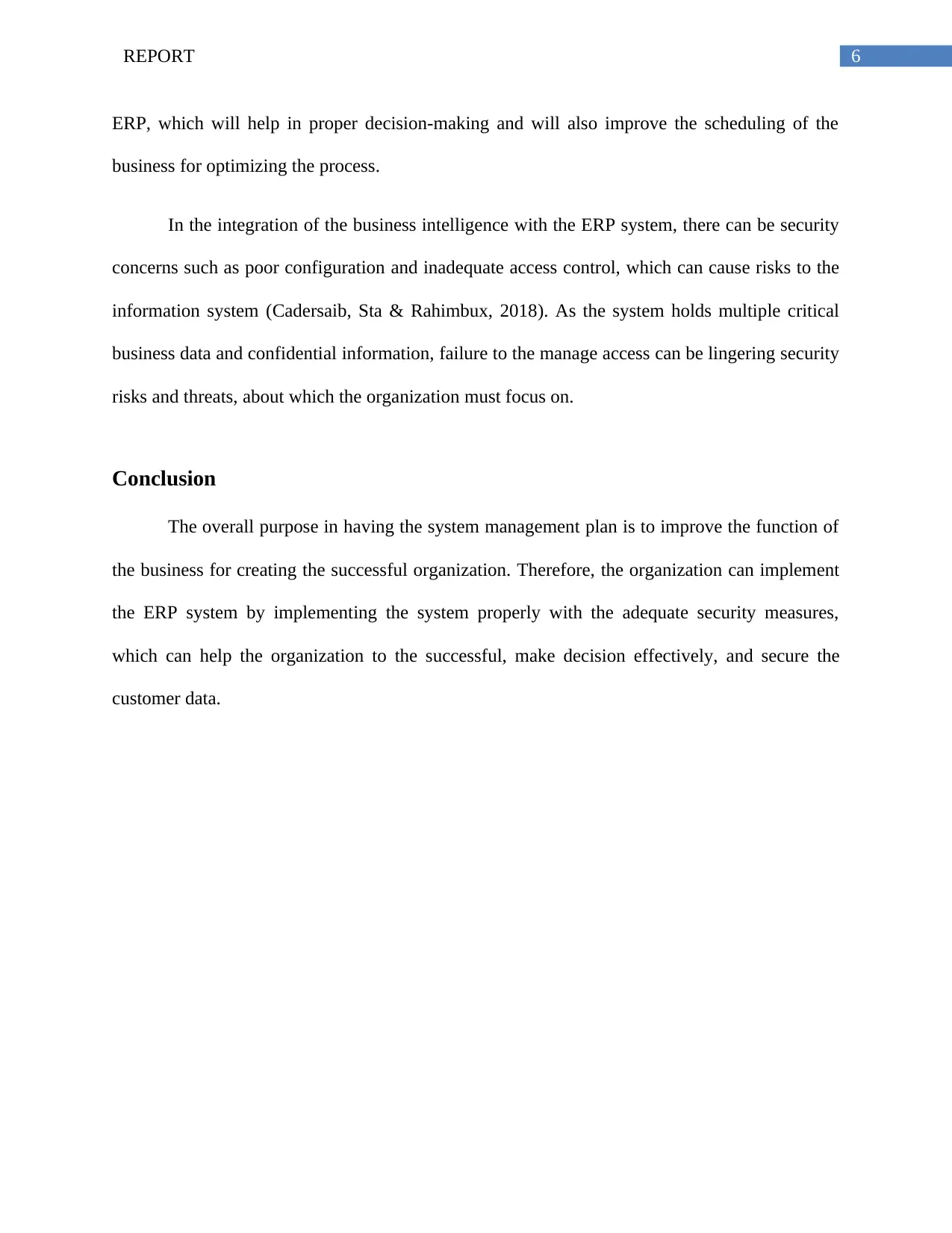
6REPORT
ERP, which will help in proper decision-making and will also improve the scheduling of the
business for optimizing the process.
In the integration of the business intelligence with the ERP system, there can be security
concerns such as poor configuration and inadequate access control, which can cause risks to the
information system (Cadersaib, Sta & Rahimbux, 2018). As the system holds multiple critical
business data and confidential information, failure to the manage access can be lingering security
risks and threats, about which the organization must focus on.
Conclusion
The overall purpose in having the system management plan is to improve the function of
the business for creating the successful organization. Therefore, the organization can implement
the ERP system by implementing the system properly with the adequate security measures,
which can help the organization to the successful, make decision effectively, and secure the
customer data.
ERP, which will help in proper decision-making and will also improve the scheduling of the
business for optimizing the process.
In the integration of the business intelligence with the ERP system, there can be security
concerns such as poor configuration and inadequate access control, which can cause risks to the
information system (Cadersaib, Sta & Rahimbux, 2018). As the system holds multiple critical
business data and confidential information, failure to the manage access can be lingering security
risks and threats, about which the organization must focus on.
Conclusion
The overall purpose in having the system management plan is to improve the function of
the business for creating the successful organization. Therefore, the organization can implement
the ERP system by implementing the system properly with the adequate security measures,
which can help the organization to the successful, make decision effectively, and secure the
customer data.
Paraphrase This Document
Need a fresh take? Get an instant paraphrase of this document with our AI Paraphraser
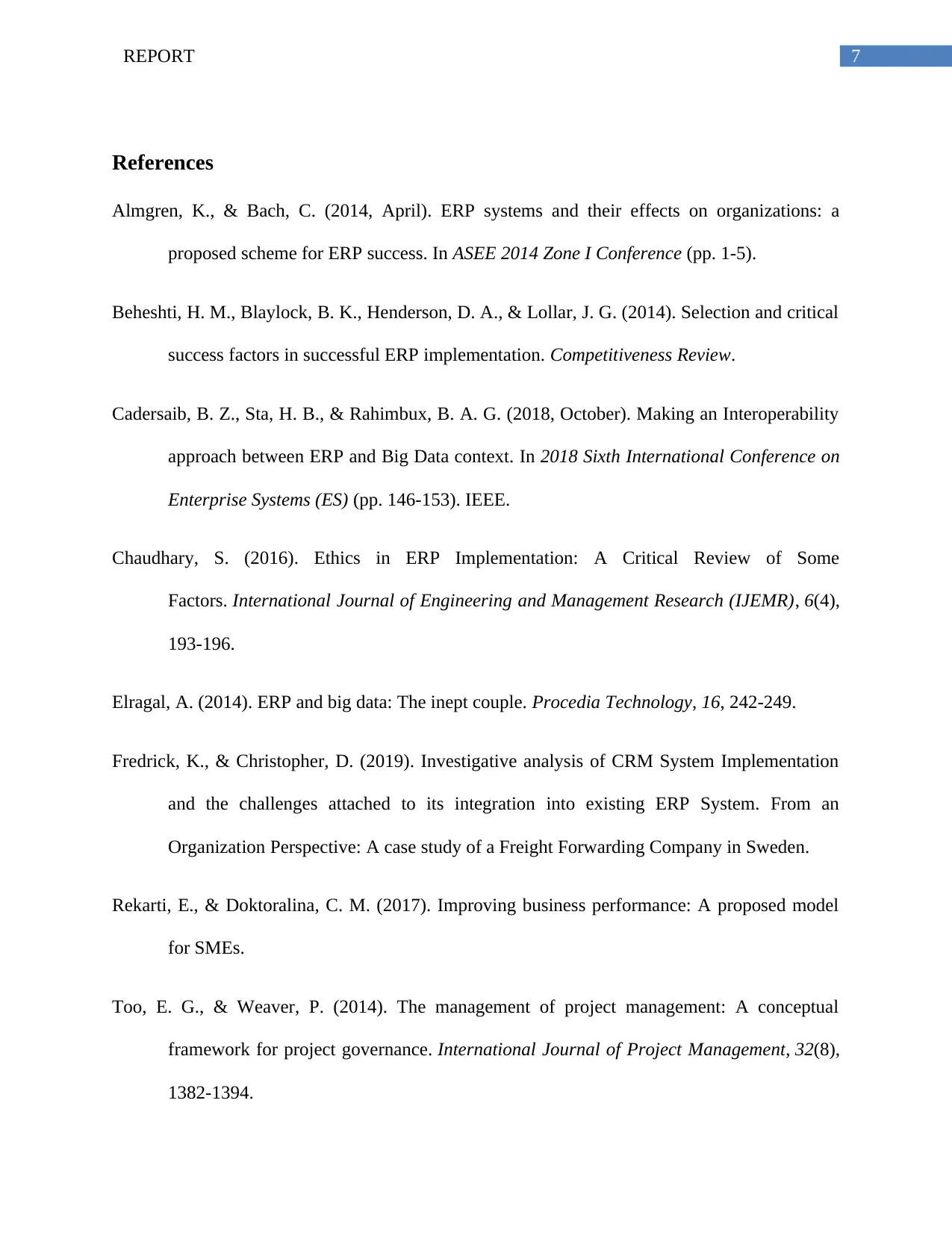
7REPORT
References
Almgren, K., & Bach, C. (2014, April). ERP systems and their effects on organizations: a
proposed scheme for ERP success. In ASEE 2014 Zone I Conference (pp. 1-5).
Beheshti, H. M., Blaylock, B. K., Henderson, D. A., & Lollar, J. G. (2014). Selection and critical
success factors in successful ERP implementation. Competitiveness Review.
Cadersaib, B. Z., Sta, H. B., & Rahimbux, B. A. G. (2018, October). Making an Interoperability
approach between ERP and Big Data context. In 2018 Sixth International Conference on
Enterprise Systems (ES) (pp. 146-153). IEEE.
Chaudhary, S. (2016). Ethics in ERP Implementation: A Critical Review of Some
Factors. International Journal of Engineering and Management Research (IJEMR), 6(4),
193-196.
Elragal, A. (2014). ERP and big data: The inept couple. Procedia Technology, 16, 242-249.
Fredrick, K., & Christopher, D. (2019). Investigative analysis of CRM System Implementation
and the challenges attached to its integration into existing ERP System. From an
Organization Perspective: A case study of a Freight Forwarding Company in Sweden.
Rekarti, E., & Doktoralina, C. M. (2017). Improving business performance: A proposed model
for SMEs.
Too, E. G., & Weaver, P. (2014). The management of project management: A conceptual
framework for project governance. International Journal of Project Management, 32(8),
1382-1394.
References
Almgren, K., & Bach, C. (2014, April). ERP systems and their effects on organizations: a
proposed scheme for ERP success. In ASEE 2014 Zone I Conference (pp. 1-5).
Beheshti, H. M., Blaylock, B. K., Henderson, D. A., & Lollar, J. G. (2014). Selection and critical
success factors in successful ERP implementation. Competitiveness Review.
Cadersaib, B. Z., Sta, H. B., & Rahimbux, B. A. G. (2018, October). Making an Interoperability
approach between ERP and Big Data context. In 2018 Sixth International Conference on
Enterprise Systems (ES) (pp. 146-153). IEEE.
Chaudhary, S. (2016). Ethics in ERP Implementation: A Critical Review of Some
Factors. International Journal of Engineering and Management Research (IJEMR), 6(4),
193-196.
Elragal, A. (2014). ERP and big data: The inept couple. Procedia Technology, 16, 242-249.
Fredrick, K., & Christopher, D. (2019). Investigative analysis of CRM System Implementation
and the challenges attached to its integration into existing ERP System. From an
Organization Perspective: A case study of a Freight Forwarding Company in Sweden.
Rekarti, E., & Doktoralina, C. M. (2017). Improving business performance: A proposed model
for SMEs.
Too, E. G., & Weaver, P. (2014). The management of project management: A conceptual
framework for project governance. International Journal of Project Management, 32(8),
1382-1394.
1 out of 8
Related Documents
Your All-in-One AI-Powered Toolkit for Academic Success.
+13062052269
info@desklib.com
Available 24*7 on WhatsApp / Email
![[object Object]](/_next/static/media/star-bottom.7253800d.svg)
Unlock your academic potential
Copyright © 2020–2026 A2Z Services. All Rights Reserved. Developed and managed by ZUCOL.





